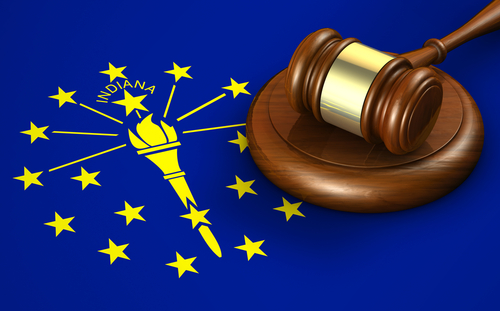'Huge market opportunity' for some law firms during ESG backlash

Photo illustration by Sara Wadford/Shutterstock
When the Securities and Exchange Commission on March 6 issued its long-awaited final rule on climate reporting for publicly traded companies, lawyers at Ropes & Gray scrambled to provide clients an initial analysis of the 885-page document.
“Within 18 hours after the final rule dropped, we had our first commentary out on the rule,” says partner Michael Littenberg, who leads the firm’s 45-lawyer practice focused on environmental, social and governance matters.
The following Monday, the group hosted a webinar on the SEC climate rule that he says drew thousands of participants. It’s not hard to imagine similar scenes unfolding at scores of other firms after the new climate regulation’s release.
Most major U.S. law firms in recent years have launched dedicated ESG practice groups to help clients navigate a surge of new rules and initiatives emerging across climate; sustainability; diversity, equity and inclusion; human capital; and other areas.
“Law firms have seen a huge market opportunity to brand themselves as ESG practitioners, and it just reflects the reality that their clients need these services,” says Brad Rosen, senior legal analyst and content strategist at consulting firm Wolters Kluwer. The firm’s 2023 survey of 700 lawyers at law firms and legal departments across the U.S. and Europe found 68% had started ESG practices within the last three years.
But more recently, law firms have run squarely into the political backlash against ESG as corporate clients and firms themselves face heightened scrutiny in relation to their climate and social initiatives.
So far, the pushback hasn’t directly threatened firms’ growing ESG practices—rather, it’s having the opposite effect as firms are enlisted to handle a wave of anti-ESG-related inquiries and legal actions on top of existing compliance and corporate work.
An anti-ESG tsunami
Much of the ESG backlash has come from state legislators and attorneys general. As of early July, some 373 anti-ESG bills had been introduced across 39 states by lawmakers since 2021, according to a state legislation tracker maintained by Pleiades Strategy, a consulting firm focusing on climate-related issues. While most have failed, 43 have been enacted in 20 states.
The legislation includes laws that seek to limit public entities’ ability to consider ESG-related factors in investment decisions; laws authorizing blacklists of financial institutions engaged in “boycotts” of companies involved in the fossil fuel industry; and laws that bar states or insurers from using social credit or ESG scores.
Attorneys general in 28 states also have joined together on initiatives—typically in the form of letters—seeking information on companies’ ESG-related activities or investments. Some firms, such as Ropes & Gray and Simpson Thacher & Bartlett, have set up trackers to help clients keep up with the myriad anti- and pro-ESG bills pending.
“The landscape is very complicated, depending on where [clients’] operations are, where investors are based, and based on their own initiatives and strategies,” says Alexandra Farmer, who leads Kirkland & Ellis’ 26-lawyer ESG & Impact practice.
Farmer says the firm has represented 30 clients just in relation to information requests sent to hundreds of financial services companies by the Oklahoma state treasurer and a similar request from the Texas state comptroller about their positions on ESG. To help deal with the backlash, the firm’s ESG group, which started in 2020, has set up a working group to keep track of anti-ESG laws that includes partners from other practices, including antitrust, Employee Retirement Income Security Act, litigation and fund formation that meets monthly to coordinate strategy and share information.
At the federal level, Kirkland & Ellis and other firms also have been kept busy by a series of hearings and investigations in connection with ESG. In early 2023, House Republicans created the ESG Working Group, led by Oversight and Investigations Subcommittee Chairman Bill Huizenga, “to combat the threat to capital markets posed by those on the far left pushing environmental, social and governance proposals.”
Further, House committees—including Oversight and Accountability, Financial Services and Judiciary—have ongoing investigations focused on ESG-related policies of President Joe Biden’s administration and financial institutions involved in initiatives formed to help fight climate change. Amid heightened political and legal risks around “woke capitalism,” Wall Street has increasingly pulled back from environmental commitments. That includes financial giants like JPMorgan Chase and State Street quitting the investor group Climate Action 100+ earlier this year.
Chilling effect
BigLaw itself has been targeted for ESG-related work or policies. That’s been especially evident in relation to diversity, equity and inclusion initiatives, which pertain to the “S” part of ESG. Controversy around the topic reached new heights last year with the U.S. Supreme Court’s landmark ruling in Students for Fair Admissions v. Harvard, which ended race-based affirmative action policies in college admissions. Since then, as a result of litigation, three big firms—Morrison & Foerster, Perkins Coie and Winston & Strawn—have subsequently opened fellowships meant for students of color to those of all races. Another firm, Adams and Reese, ended its diversity fellowship after receiving a letter threatening litigation. (See “Now What?” December-January, page 12.)
Meanwhile, as ESG practice groups tackled mounting compliance and litigation work last year, activity on the transactional side slackened somewhat—a result of market conditions, heightened political and regulatory scrutiny or some combination thereof.
U.S. sustainable funds—those that use ESG criteria to evaluate investments—saw their first net outflows in 2023 total over $13 billion, compared to net inflows of nearly $70 billion in 2021. Meanwhile, fewer new sustainable funds were launched, as the total fell to 66 from 103 in 2022 and 116 in 2021, according to Morningstar.
“So certainly, there’s less ESG funds being set up,” says Littenberg of Ropes & Gray, which has a large asset management practice that includes clients such as Bain Capital. “There’s less froth in that area because there’s just not as much investor interest.”
At the same time, client demand for advice on regulatory issues around sustainable investing has risen. “So we’ll continue to see demand wax and wane in different areas of ESG over time,” Littenberg adds.
For its part, Jones Day sees a big opportunity in transactions and investment around energy transition—the shift from fossil fuels to renewable energy sources such as solar and wind power.
“That is going to be a trillion-dollar area for the next 10 to 15 to 20 years, and I think every one of our clients will be impacted by that,” says partner Howard Sidman, who is deputy chair of the firm’s ESG practice. Launched only at the start of last year, the group has a core of about 50 lawyers with as many as 200 working on ESG-related matters at a given time, he says.
Considering Jones Day’s representation of North American Coal Corp. in West Virginia against the Environmental Protection Agency, which resulted in the 2022 landmark Supreme Court opinion that limited the agency’s ability to regulate carbon emissions, the firm’s enthusiasm for facilitating the energy transition may seem incongruous. The firm also reportedly played an influential role in then-President Donald Trump’s administration, which withdrew the U.S. from the Paris climate accords and was a proponent of the fossil fuel industry.
But Sidman stresses that doesn’t put the firm in the anti-ESG camp.
“We represent clients, not causes. And we all need to advocate for our clients’ interests.” He adds the firm is “agnostic” when it comes to the political environment.
Navigating a political divide
ESG partners at other firms voice a similar adherence to staying above the political fray.
“What we focus on is helping clients navigate the pro-ESG and anti-ESG developments in terms of regulation, legislation and investor expectations,” Kirkland & Ellis’ Farmer says.
Highlighting less fractious aspects of ESG is another approach firms are taking to help guide clients through the political turmoil. Beth Sasfai, who left her role as chief ESG officer at Verizon in 2023 to start Cooley’s formal ESG practice, says focusing on an area like cybersecurity can help with clients who might be initially skeptical of ESG.
“For many industries, cybersecurity and security data is a key ESG issue, and no one thinks a company shouldn’t have governance and risk management processes in place to manage that risk. So that tends to be not as political,” she says.
Likewise, instead of starting off talking about climate change with certain clients, Sasfai says she’ll focus on how major weather events might pose risks to their facilities or supply chains.
Even the “ESG” label has become a political football, she notes. “The acronym has been weaponized, frankly,” Sasfai says.
That’s led to a broader aversion to the term. Larry Fink, CEO of asset manager BlackRock, for instance, last year publicly disavowed the use of “ESG,” and the firm since has dropped ESG investing to focus on the environmental element as “transition investing.” And Wolter Kluwer’s Rosen says anecdotal evidence suggests even some law firms lately are minimizing ESG-related content on their sites.
Still, a group of Wachtell, Lipton, Rosen & Katz lawyers argued in a February post on the Harvard Law School Forum on Corporate Governance blog that while “ESG” may be receding from the corporate lexicon, “the need to address the environmental, social and governance issues that may materially impact long-term performance and value creation … remain as relevant as ever.”
In that vein, a KPMG survey of 550 company directors and managers found 90% planned to increase ESG-related investments over the next three years. That spending would fund expenses such as adding dedicated ESG personnel and external consulting and advisory services.
Given the demand indicated by the KPMG survey and more ESG-related regulatory changes pending in the U.S. and Europe, firms expect no slowdown.
“We’ve just seen the demand for work increase, and I don’t think it’s changing anytime soon,” Cooley’s Sasfai says.
This story was originally published in the August-September 2024 issue of the ABA Journal under the headline: “Backlash Benefits: Law firm practice groups advising on ESG initiatives were well-positioned when they got challenged.”



